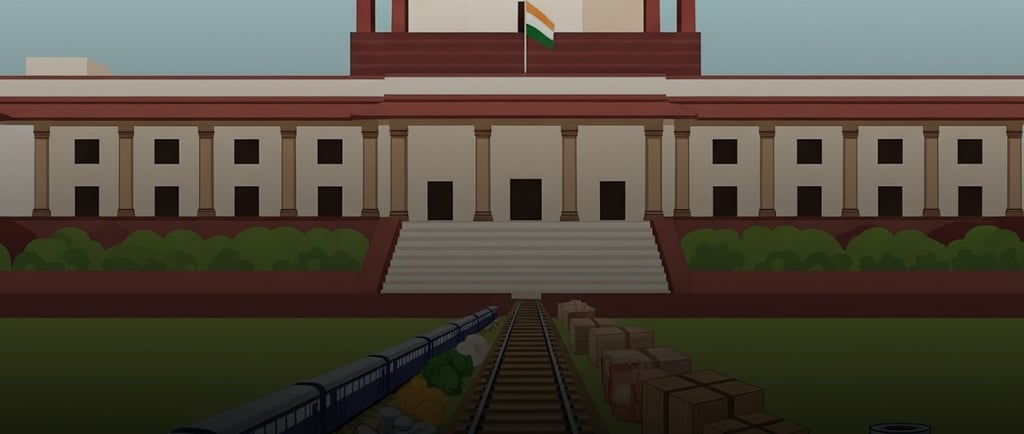Supreme Court Rules in Favor of Railways on Post-Delivery Penalty Notices in Misdeclaration Case
In a significant judgment with wide implications for freight operations across Indian Railways, the Supreme Court on 5th June 2025 ruled in favor of the Union of India, allowing railway authorities to levy punitive charges for misdeclared goods even after delivery has been completed. The case—Union of India vs M/s Kamakhya Transport Pvt. Ltd. and Others—overturned a Gauhati High Court ruling that had disallowed post-delivery penalty notices issued by the Railways.
6/21/20253 min read


Background of the Dispute
The dispute arose from demand notices issued by Indian Railways against several logistics and transport companies including Kamakhya Transport Pvt. Ltd., Vinayak Logistics, and C.M. Traders, in 2011 and 2012. These notices claimed that consignments were misdeclared, i.e., the type of goods stated did not match what was actually loaded. The Railway authorities imposed penal charges under Section 66 of the Railways Act, 1989.
Although the transport companies paid the amounts demanded, they subsequently filed claim petitions before the Railway Claims Tribunal, Guwahati, arguing that the demands were illegal as they were raised after the goods were delivered. The Tribunal, agreeing with their arguments and citing earlier Gauhati High Court decisions, directed a refund of the amounts paid with 6% interest per annum.
The amounts refunded by the Tribunal were substantial, with Kamakhya Transport alone receiving over ₹18 lakhs in two orders. The Tribunal's conclusion rested primarily on the interpretation that Sections 73 and 74 of the Railways Act required all punitive charges to be raised before delivery.
High Court Decision
The Union of India appealed the Tribunal's decision to the Gauhati High Court, asserting that the misdeclaration of goods is covered under Section 66—not Section 73 (which deals with overloading). The High Court, however, dismissed the appeal. It maintained that both Section 74 of the Act and Rule 1820 of the Railway Commercial Manual require dues to be recovered before delivery. The court also relied on the precedent in Jagjit Cotton Textile Mills v. Chief Commercial Superintendent, where it was held that penal charges should be imposed prior to delivery.
Supreme Court Analysis
The Supreme Court, comprising Justices Sanjay Karol and Prashant Kumar Mishra, examined the legal question of whether demand notices for misdeclared goods can be issued after delivery has occurred.
The Union of India contended that the lower courts misinterpreted the nature of the case by equating it with wagon overloading governed by Section 73. Instead, they argued that misdeclaration falls squarely under Section 66 of the Act, which empowers railways to charge double the highest freight rate if the description of goods is found to be materially false. Importantly, Section 66 does not stipulate that such charges must be imposed before delivery.
The respondents reiterated their stance that the demands were time-barred and violated principles of natural justice since they were raised post-delivery. They also questioned the authenticity of the demand notices, though the court found no evidence to substantiate these claims.
Justice Sanjay Karol, delivering the judgment, emphasized that the provisions of Section 66 differ fundamentally from Sections 73 and 74. The court noted that Section 66 allows charges to be levied without any temporal limitation—meaning they can be enforced before or after delivery. The court clarified that misdeclaration and overloading are treated separately under the law and that the Gauhati High Court erroneously conflated the two issues.
“The legislative intent had to be, to permit levy of charge under Section 66, at either stage and not at a specific one,” the judgment observed. The Court stressed that nowhere in Section 66 is there a restriction limiting the timing of demand notices, as long as the misdeclaration can be substantiated.
Misreading of Jagjit Cotton Case
The Supreme Court also rebuked the High Court’s reliance on Jagjit Cotton Textile Mills, clarifying that the decision in that case was in the context of Section 54 of the Act, which concerns the conditions under which the railway administration can receive or deliver goods. The Court held that this precedent did not apply to matters governed by Section 66 and should not have been extended to interpret the current issue.
“When this Court observed that penal charges could be collected before delivering the goods, it was merely suggesting one of the conditions possible under Section 54. This cannot be interpreted as a mandatory requirement applicable to all sections,” the Court said.
Verdict and Implications
Concluding that the Railway Claims Tribunal and the Gauhati High Court had misapplied the law, the Supreme Court allowed the civil appeals filed by the Union of India and set aside the impugned judgment dated 20th December 2021.
With this ruling, the Supreme Court has not only reversed substantial financial refunds awarded to private transporters but has also clarified the scope of Section 66, effectively strengthening the Indian Railways' ability to enforce compliance and penalize misdeclaration even after consignment delivery.
This verdict is expected to have far-reaching implications on how freight operations are managed across the nation. It sends a clear message that misdeclaring goods—even if detected post-delivery—will not shield consignors from penalties.
Pending applications, if any, were disposed of.
